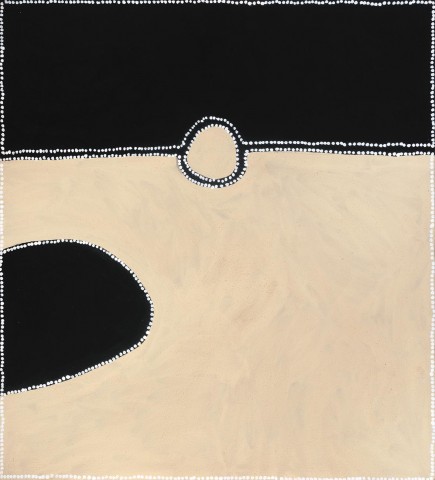BUSH TURKEY DREAMING, 2001
PADDY NYUNKUNY BEDFORD
ochres and pigment with acrylic binder on Belgian linen
135.0 x 122.0 cm
signed with initials verso: PB
bears inscription verso: artist’s name, title, date, and Jirrawun Arts cat. PB 8 2001-108
Jirrawun Arts, Kununurra
Short Street Gallery, Broome
Private collection, New South Wales
Storer, R., Paddy Bedford, Museum of Contemporary Art, Sydney, 2006, p. 150 (illus.)
Lightning Creek, 2004, ochres and pigment with acrylic binder on composition board, 80.0 x 100.0 cm, in the collection of the National Gallery of Victoria, Melbourne, illus. in Storer, R., Paddy Bedford, Museum of Contemporary Art, Sydney, 2006, p. 101
This work is accompanied by a certificate of authenticity from Short Street Gallery and a Jirrawun Arts cataloguing sheet.
Typified by bold forms and a balance in composition, the paintings of Paddy Bedford are a combination of modern materials and traditional pictorial conventions, contemporary experience and ancient belief systems. His art evokes the rivers, roads, waterholes, rock escarpments and other features of the Kimberley landscape, reflecting the artist’s knowledge of land he criss-crossed in his former life as a stockman. Behind the subtlety and harmony of each composition exists a learned and deep knowledge of the land and its creation stories describing how the landscape, plants and animals were created and in which the laws governing much human behaviour were instituted.
Lerndijwaneman or Lightning Creek is in part of the artist’s father’s country and is the home of Birnkirrbal, the ancestral bush turkey. One of the artist’s important Dreamings and a favourite painting subject, Lerndijwaneman lies at the northern end of his country, beside the Wilson River in the shadow of the Durack Range. In mythological times, the site is where Birnkirrbal made camp after she had left the emu at Garnanganyjel (Mount King). As Paddy Bedford narrates the story, ‘The Turkey had travelled a long distance and stopped at Lerndijwaneman to rest and eat a little fruit called gawoorroony. [Here she] … went to sleep on the red ground (indicated by the circle in the upper part of the picture). If the emu had had her way, they would have kept walking and there would have been constant daylight. Without this rule for sleeping made by the turkey there would have been no rest, only constant day … Because the Turkey did that, we all sleep at night’.1 Lerndijwaneman is also the place where another ancestor, the eagle in the form of a man, flaked stone to make spearheads.2
1. Storer, R., Paddy Bedford, Museum of Contemporary Art, Sydney, 2006, p. 80
2. Information from the accompanying catalogue notes from Jirrawun Arts
CRISPIN GUTTERIDGE
